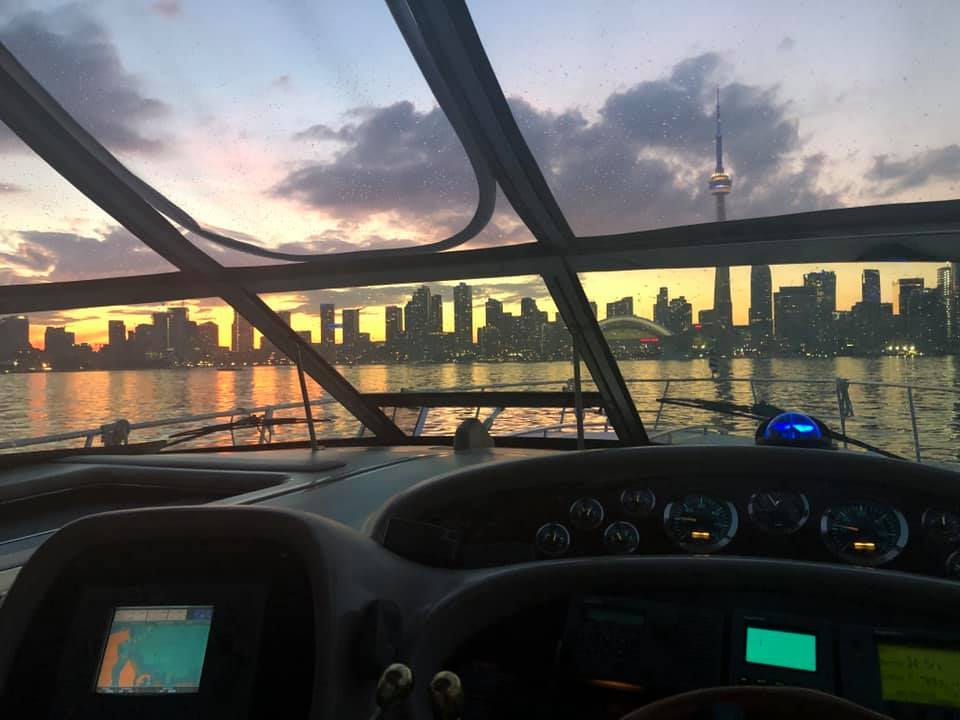

Nov 26, 2025


Nov 19, 2025

Updated: May 16, 2022
By: Steven Bull

I grew up in the east end of Toronto less than a kilometre from the shores of Lake Ontario. I learned how to canoe and kayak at day camps on the Rouge River, which the houses across the street from ours backed onto. Instead of house parties, I regularly attended beach parties during high school. All this to say, I’ve always been well aware of Toronto’s geographic layout.
Despite this it wasn’t until 2014 when my wife and I bought our first boat, a 2001 Sea Ray 380 Sundancer, that I truly felt that I was living in a waterfront city.
I dig my hometown. I truly do. I’m not one of those Toronto haters despite how fashionable it might be at times (note: I’m also not fashionable). It’s just that I’ve been explore boating destinations all over North America while I was hosting PowerBoat Television and I’ve seen what a real waterfront city can be like.
The selfish, silver lining here is that boating out of the Toronto Islands is, therefore, not a well-known or appreciated option, on the whole, and we were able to get a slip where we wanted, when we wanted, and were established in our floating summer lifestyle before my son was born.
Don’t get me wrong, there is a boating culture. It's just an oddly isolated one given it’s in the shadow of Canada's largest city.
There are three yacht clubs from east to west: Queen City Yacht Club, Royal Canadian Yacht Club, and Island Yacht Club. There is also a public marina on the islands which is home to Harbour City Yacht Club, of which I’m Vice-Commodore, if you please. And when you include Outer Harbour Marina, Marina Four, Marina Quay West and National Yacht Club, you’ve got a couple thousand boats with seasonal berths in or around Toronto’s central harbour.
















Still, there is no public day-docking city-side like many other cities have. There are no restaurants along the waterfront you can tie up to for lunch if you’ve cruised in from one of the dozens of marinas or yacht clubs along the shores of Lake Ontario. It all feels like a lost opportunity.
When I tell people we have a boat, the automatic assumption is we keep it somewhere on Georgian Bay or possibly along the Trent-Severn Waterway. When I say we keep it in Toronto it’s usually greeted a healthy dose of surprise with a dash of disgust (“Ew, isn’t the water dirty?”) or eye-rolling (“That’s gotta be boring!”).
To the first reaction, yes and no. The inner harbour is nothing you’d want to swim in, but there are lakes in Muskoka I won’t swim in because I, and my son, have gotten Swimmer’s Itch from parasites in the water and there are cottages on those lakes. The beaches on the outside of the islands are Blue Flag beaches which means they meet international water quality standards. And to the second point, heck no! I love the islands. It’s our floating cottage. Kayaking through the lagoons you can easily forget you’re in Toronto until you catch a peak of the CN Tower between the trees. A favourite spot for my son finds us surrounded by lily pads watching herons slowly stalking their underwater prey along the shorelines or counting turtles sunning themselves on logs before they drop in the water as we cruise by.
Being on a large lake is great, too. In “The Great Before” when COVID was more likely to be the name of some co-operative video store than a dangerous virus that would shut down the world, we would make an annual crossing to the New York side of the lake, or cruise to other urban oases like the Oakville PowerBoat Club and feel lost in the trees of 16 Mile Creek. With all due respect to Oakville, I’d never consider a vacation there on land, but it - along with Port Credit - would be another annual must-visit spot. And with a father-in-law who had a fishing charter back in the 80s and early 90s, I’ve inherited some downriggers and blindly attempt to take part in the annual, and lucrative, Great Ontario Salmon Derby. Best I’ve done was a 20-pounder and that’s basically half of what I need to win even a small weekly prize.
In fact, our love of being on the water in Toronto has led to us getting a second dock and a larger tender, a 13-foot RIB, to use as a commuter and free ourselves from the rigidity of ferry schedules. This has opened a whole new world of possibilities and we have begun commuting to work both day and night, even at 4:30am in the morning when I’m doing work with CBC Sports, with whom I do occasional hosting gigs on TV and Radio.
Night boating isn’t for everyone, but for me it’s a brief moment of zen that certainly takes the sting out of an alarm that starts with the number 4 and ends with “am”! The skyline is a shimmering, artistic nightlight that serves as a personal lighthouse, guiding my way in. The only real downside is that - like any night boating - you need to be extra cautious as deadheads in the water are nearly impossible to spot until you’re about to hit one and it’s often too late. But if you go at a reasonable pace, you’re fine. The only real concern is that I’m tempted to go on a joyride and not a straight A-to-B run.
Heading back “home” after leaving the studio, it doesn’t matter how hectic it is city-side, or how tired or stressed I may feel, there’s something about getting out onto the water, even if just a short shot back to the marina, that is like an internal reset button.
I joked with a colleague that I’ve never woken up on my boat in a bad mood. I’ve been upset my alarm went off, sure, or unhappy with what I needed to face later that day, but something about just being on the boat is soothing.
Being able to use it on weekends without a multi-hour commute is something I love, and being able to stay on it during weekdays and commute into the city is a bonus I hadn’t considered when we made the decision to berth our boat at the islands.
It’s not for everyone, and that’s ok. The secret is out and it’s already starting to get a little crowded!





Where do you dock your commuter RIB on the city side?
This is a great story and I thank you for it. My wife and I have a 21’ cuddy and we boat in the thousand Islands area mostly and Kingston is the farthest we went , my question is , is it possible or doable to go all the way to Toronto on a boat like mine , is there anybody that does that Guy